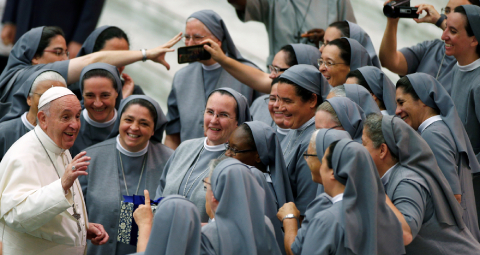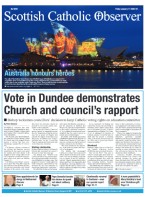January 17 | ![]() 0 COMMENTS
0 COMMENTS ![]() print
print

Woman’s place at Pope Francis’ right hand?
With reform in the air, the Catholic News Service surveys moves to promote women in the Curia
Pope Francis opened 2020 with a strong call to acknowledge the dignity of women, end violence against them and stop the exploitation of women’s bodies.
His homily on January 1 was not generic: it referenced prostitution, rape, coerced abortion, pornography and even advertising.
The Pope called for the involvement of women in decision-making processes in civil society, specifically when it comes to promoting peace.
At the Mass on the Feast of Mary, Mother of God, he said the Church is ‘woman and mother,’ but he did not use the homily to address the roles of women in formal church structures.
2020 changes
However, there are strong indications some changes will be coming in 2020, and not just because of the New Year’s homily.
Publication of the Pope’s plan for the new configuration of the Curia and his apostolic exhortation reflecting on the themes of the Synod of Bishops for the Amazon are expected early in the year.
The draft document for Curia reform, ‘Praedicate Evangelium’ (Preach the Gospel), said the office of Vatican Secretary of State must be held by a cardinal. But other than that, it said, the reform, “should also involve lay women and men in governing roles of importance and responsibility.”
The draft insisted the Church’s hierarchical structure was willed by Christ, but that does not mean only the Pope, bishops and other clerics are responsible for the Church and its mission in the world.
Essential participation
In fact, it said, in the Roman Curia “the presence and participation of laypeople—women and men—is more essential than ever,” especially the contributions of laypeople living their Faith through their family life and in their engagement with the world. The draft suggested laypeople would be particularly appropriate leaders “when dealing with the promotion of the family and respect for life and creation, with the Gospel as the leaven of temporal realities and with discerning the signs of the times.”
While the overall Curia reform project has taken years, Pope Francis already anticipated some changes: the prefect of the Dicastery for Communication is a layman; and the two undersecretaries of the Dicastery for Laity, the Family and Life are laywomen.
In 2004, St John Paul II appointed a woman religious as undersecretary of the Congregation for Institutes of Consecrated Life and Societies of Apostolic Life, a practice that has continued.
In late October, at the end of the Amazon synod, which repeatedly referred to the leadership of women in Faith communities throughout the region, Pope Francis promised to “reconvene” and expand his commission to study the diaconate of women.
Briefing
Phyllis Zagano, a member of the original commission and an expert on the subject from Hofstra University, New York, said she had not heard anything of a renewed brief for the panel.
Ms Zagano noticed the difference in the way Pope Francis spoke about women in his New Year homily, and wondered if one litmus test for new leaders in the Roman Curia would be, “Can you work with women?”
“I think Pope Francis is quite serious about listening to women,” she said. “His problem is that some in the Curia are not. He will do what he can.”
Unfortunately, she said, until Pope Francis “has a woman standing next to him proclaiming the Gospel, nothing he says about women will be heard.”
Synod of Bishops
In May, Pope Francis appointed six consultants to the general secretariat of the Synod of Bishops, the office that coordinates the gathering. Five of the six were women, the first women to serve in that position.
Xaviere Missionary Sister Nathalie Becquart, who was an observer at the 2018 Synod of Bishops on young people, was one of the consultants named. She said the appointment was “a symbolic and effective step toward appointing more women at the Curia, and it reflects Pope Francis’ desire to give more places to women at all levels of the Church.”
Sr Becquart, ex-director of youth evangelisation and vocations for the French bishops’ conference, is convinced more progress will come.
Equality
“Changes will come with the new generation as more and more young people—not only young women but also young men—ask for women’s equality,” she said.
Added hope comes from meeting “more and more priests and bishops now that are speaking out for women. I have seen an evolution; at the beginning, the question of women in the Church was a question from women, and now it is also an important topic for many men, priests and bishops—and even the Pope!”
But one won’t be able to say there is true collaboration between men and women at all levels of the Church until there are “more women in leadership positions and decision-making processes,” she said.
Obviously, the Pope should continue appointing women, she said.
But she added: “Another symbolic step could be, for instance, that he ask a woman to lead the spiritual retreat for the Curia one year.”










